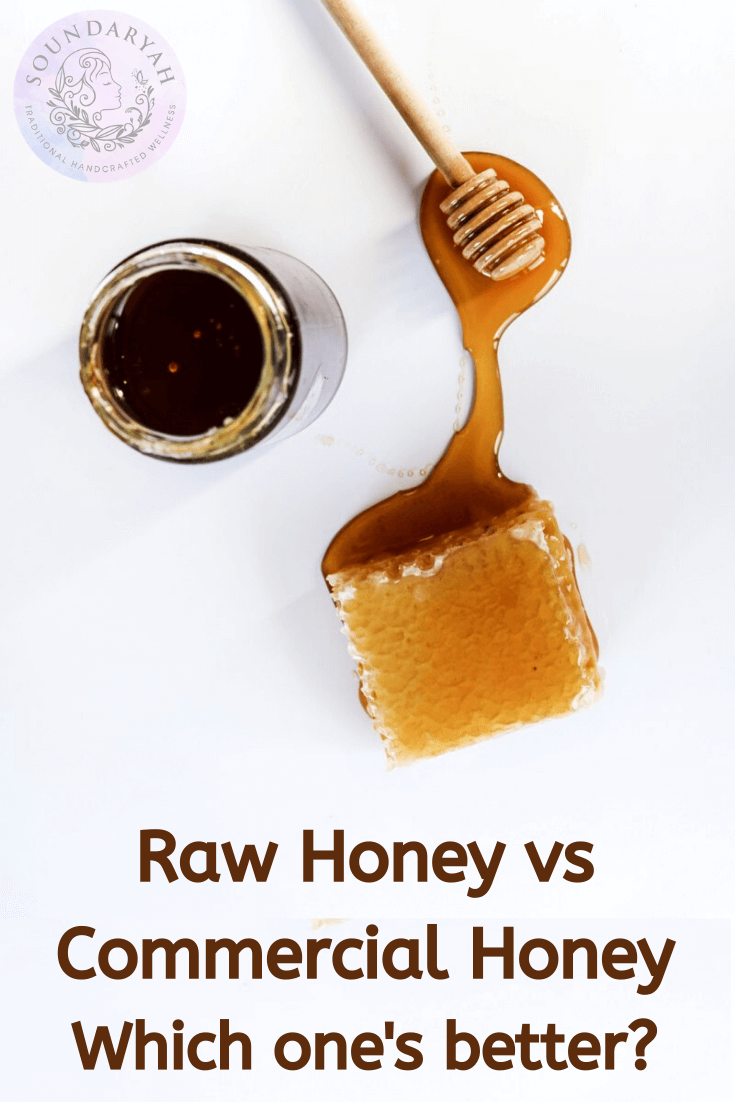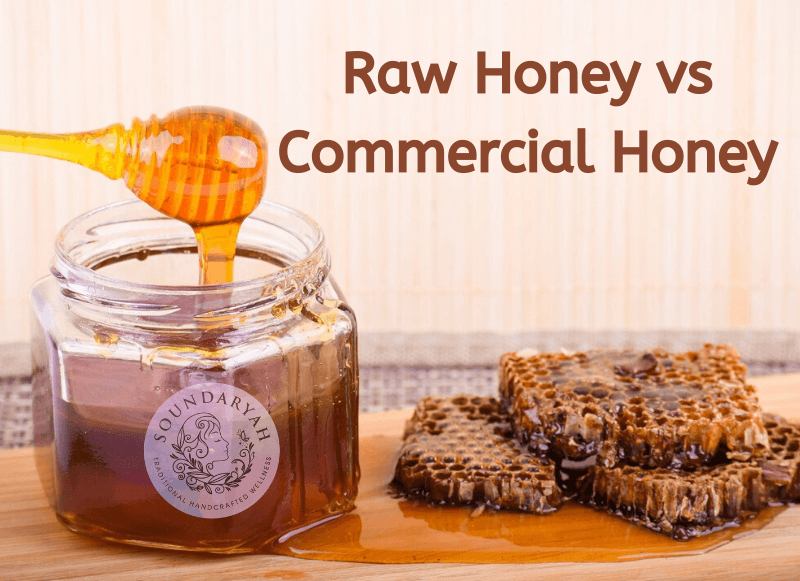Raw Honey vs Commercial Honey – which one should you choose? Let’s find out by assessing the qualities and comparing these varieties of honey side by side.
The extensive health benefits of honey are no secret these days, and it’s no wonder that everyone is out to get themselves a bottle of this healing liquid gold. But then the question that arises is this – where do you buy honey from? A simple enough question, but the answer’s not so easy!
Do you get your honey from your local store? Or do you order it from a fancy gourmet supermarket? Or do you hike out to the nearest bee farm to get it straight from the bees? How you answer this question will make a big difference in how effective the honey is for your purpose.
In the early days, honey was used as food as well as medicine, but then the only honey people knew was the one directly harvested from the hive. However, today you can find honey available in all kinds of formats, including the ones on supermarket shelves. As the demand for honey increases, more and more brands are coming out with their own version.
But how good is this commercial honey? Is it as effective as the raw honey people have been using for generations? Today, we’re going to look at this in more detail, so at the end, you can make an informed choice on what honey to get for yourself.
Raw Honey vs Commercial Honey

-
Sourcing

As its name suggests, raw honey is just that – absolutely RAW. It is honey just as the bees have made it, coming straight from the honeycomb. The beekeeper extracts the honey from the honeycomb and pours it over a mesh to filter it from dirt and impurities like dead bees. Once the honey is strained in this manner, it is bottled up straight away and ready to use.
Commercial honey, or the ones you see in supermarkets, go through some more processing before being bottled, such as:
- Pasteurization – Heating the honey to a high temperature to make it smoother. This usually ends up destroying the natural components of raw honey, like bee pollen, bee propolis, antioxidants, amino acids, and other enzymes.
- Filtration – This removes some more impurities and air bubbles in the honey to improve its appearance and clarity.
- Ultrafiltration – Heating the honey, diluting it and then forcing it through tiny filters at high pressure. This makes the honey more transparent and good looking but also removes any remaining health benefits in the process.
-
Appearance

Raw honey has a cloudy look, and can even be opaque because it still contains all its original natural ingredients. It also appears thick, or slightly semi-solid. Raw honey can have wide variations in color from yellow to brown, based on what flowers were pollinated by the bees. Some varieties are Manuka honey (made by pollinating the manuka bush), Forest honey (made from honeydew taken from trees) and Acacia honey (made by pollinating the flowers of the black locust tree).
Commercial honey is smooth and clear, after all the filtration it goes through. Since a good part of the natural ingredients are removed, it looks lighter and thinner than raw honey.
-
Bee Pollen

The presence of bee pollen is one of the most distinguishing features of raw honey, and also what makes it so valuable. Bee pollen is considered a superfood on its own, with over 250 healthy ingredients like amino acids, antioxidants, micronutrients, and essential fatty acids. Bee pollen is found to be anti-inflammatory, antibacterial and anti-fungal in nature. It has so many health benefits that it is considered a medicine by the German Federal Ministry of Health.
The simple process of pasteurization or heating the honey to high temperatures completely destroys the bee pollen in it. Besides, bee pollen helps track the original source of honey and destroying it also removes any trace of the honey’s origin.
-
Bee Propolis

Bee Propolis, or ‘Bee glue’, is a mixture of sticky substances honeybees use to hold and seal their hives. It also protects the hive from micro-organisms due to its anti-bacterial, anti-viral and anti-fungal resins. Bee propolis also contains Vitamins B, C, E, magnesium, and potassium. Scientists believe that the benefits of bee propolis extend to humans, with anti-inflammatory and anti-cancer properties.
Commercial honey does not contain this propolis since any kind of processing removes it from the honey.
- Antioxidants

Raw honey contains a whole array of nutrients, but the most prominent among these are antioxidants, including polyphenols, flavonoids, and phenolic acids. These antioxidants reduce oxidative stress in the body, which is the cause of many serious illnesses like heart disease and cancer. They also reduce inflammation in the body. The kind of antioxidants in honey may differ based on the flowers used in pollination.
Commercial honey contains little to no antioxidants, depending upon the degree of processing it has gone through. A study that compared the antioxidant content of raw and processed honey from local stores found that the raw honey contained nearly 4 times more antioxidants than the commercial honey.
Also Read: 12 Benefits of Honey According to Ayurveda
-
Sweeteners

Since raw honey is ‘just as the bees made it’, it contains no sugar other than what is naturally present. Raw honey is sold without any kind of other flavoring agents either.
Commercial honey, on the other hand, has a different story to tell. With the high demand for honey, companies often dilute their honey with water and add sweeteners like refined sugar, brown rice syrup or high fructose corn syrup. As a result, only a small percentage of commercial honey is real honey – the rest is just artificially sweetened liquid.
-
Physical Properties

It is easy to identify raw honey simply by its physical properties. At room temperature, raw honey crystallizes over time, getting thicker. Raw honey doesn’t dissolve easily, lumping when put into a glass of water. If a matchstick is dipped in raw honey and then struck, it will light easily.
Commercial honey maintains its syrup-like state for much longer than raw honey. It also dissolves quickly into water. Another difference is how commercial honey reacts to the matchstick test. Due to the extra water/moisture in it, commercial honey does not make the matchstick light up.

From this, it is obvious that if you want to get the various health benefits of honey, it is essential to get the right kind of honey – raw honey. There is no use in getting home honey that has been stripped of all its important nutrients – you’re just buying sweet syrup!
While it takes a bit of investigation to figure out if the honey you’re buying is raw or processed, there are some more varieties of honey that can cause confusion. One example is ‘organic honey’. Organic honey need not necessarily be the same as raw honey. Organic means that the honey is from a farm that uses organic beekeeping, i.e. the flowers are not sprayed with chemicals and the bees are not given antibiotics. However, it does not mean that the honey is not pasteurized or heated.
It is important to remember that both raw honey and commercial honey may contain small amounts of the Clostridium botulinum bacteria. This can easily cause food poisoning in babies, which is why honey is not recommended for children under the age of one year. People who have pollen allergy may also have an allergy to certain kinds of raw honey.

Did you find our Raw Honey vs Commercial Honey – Which one’s better? blog interesting, please let us know in the comments section.


 Verified Purchase
Verified Purchase



![Youthful Glow Herbal Face Wash [100g] - Soundaryah](http://soundaryah.com/cdn/shop/products/1a_b5d64eda-7417-41b9-bad5-b271f4ef68ff_300x.jpg?v=1634899930)
![Royal Herbal Hair Wash [200g] - Soundaryah](http://soundaryah.com/cdn/shop/products/1_300x.jpg?v=1669120964)
![Intensive Body Polishing Ubtan [200g] - Soundaryah](http://soundaryah.com/cdn/shop/products/1a_8728dcb7-c696-447d-b42e-0a56a5326fb6_300x.jpg?v=1634899848)